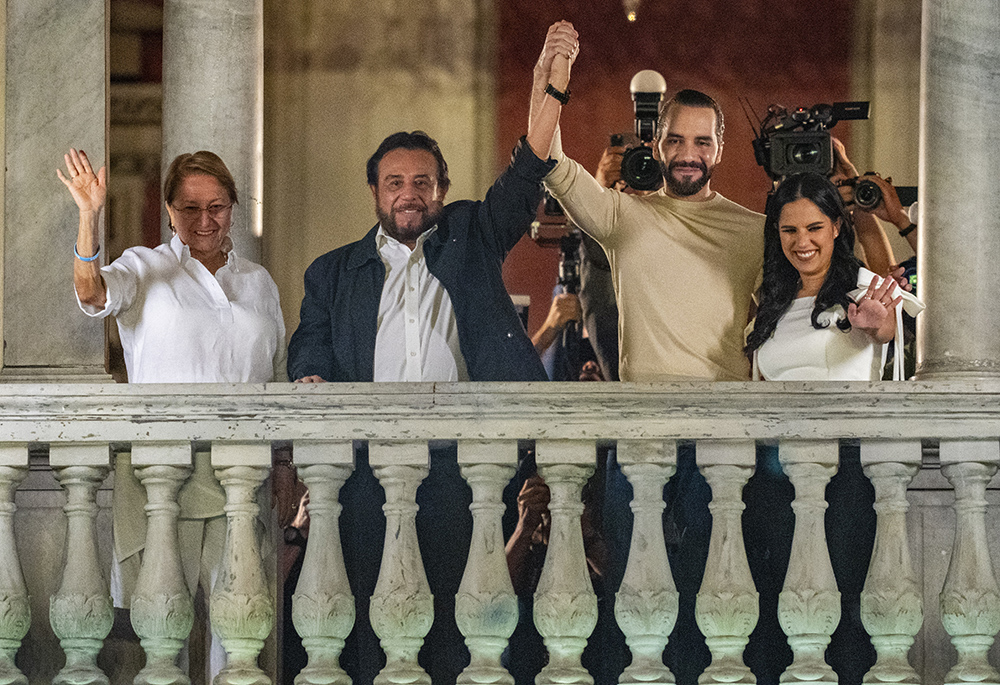
El Salvador President Nayib Bukele, second from right, his wife Gabriela Rodriguez, right, running mate and Vice President Félix Ulloa, second from left, and his wife Lilian Alvarenga wave to supporters from the balcony of the presidential palace after general elections polls closed Feb. 4 in San Salvador, El Salvador. (AP photo/Moises Castillo)
Sandra Patricia Lazo feared the return of violence in an El Salvador without Nayib Bukele. That's why, on Feb. 4, she voted for him for president for a second time — even though her country's constitution prohibits consecutive presidential reelection.
Preliminary vote counts point to an overwhelming win by Bukele, who wasted no time claiming victory and gathered tens of thousands of supporters at San Salvador's historic city center, where he highlighted his war against the country's criminal gangs and the alleged failure of past governments. He took shots at journalists and nongovernmental organizations, and capped his speech by playing R.E.M.'s 1987 hit "It's the End of the World as We Know It (And I Feel Fine)."
Those like Lazo, happy with Bukele's efforts to reduce gang violence, say their lives have changed for the better. She no longer fears being attacked or robbed walking home from Mass.
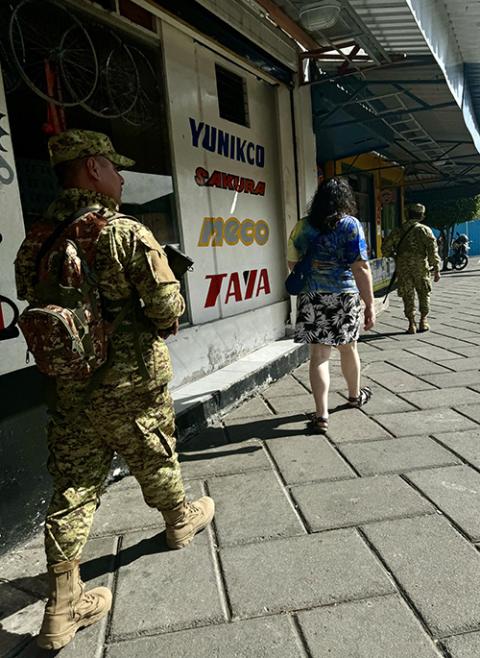
Soldiers march Jan. 30 near the cathedral of San Salvador, days before presidential and legislative elections in El Salvador. (NCR photo/Rhina Guidos)
"I live in a troublesome area and there has been a change," she said.
As Lazo made her way through the heavy traffic of San Salvador Jan. 31, Bukele's voice came on Radio Luz, a Catholic station, when a political ad played. It was necessary to vote for his Nuevas Ideas party, Bukele said in the ad, "so we don't return to that past of violence and corruption."
But other Salvadorans, such as Fr. Jesus Bonilla, said Bukele manipulated Salvadorans, preying on their fears of gangs to win an unconstitutional reelection, shutting down opposition members and denying them federal money to campaign. Many voters expressed lack of knowledge of candidates on the ballot, except for the president's party.
"These are the most unequal presidential elections in El Salvador [after the Peace Accords] where there is a dominant propaganda — the government's," Bonilla said.
Wendy Torres said even she, too, is happy with the newfound peace, but there's an uneasiness about the dominance of one party.
"We were just saying that in the previous elections, it was like a big party. There was an expectation between two contenders," she said. But long before election day arrived this year, "the results were already settled and it was like, a very apathetic election. I don't even know how to define it."
A government promising its citizens security should be a right and not a political issue, Torres said, saying she is worried about the price of tranquility.
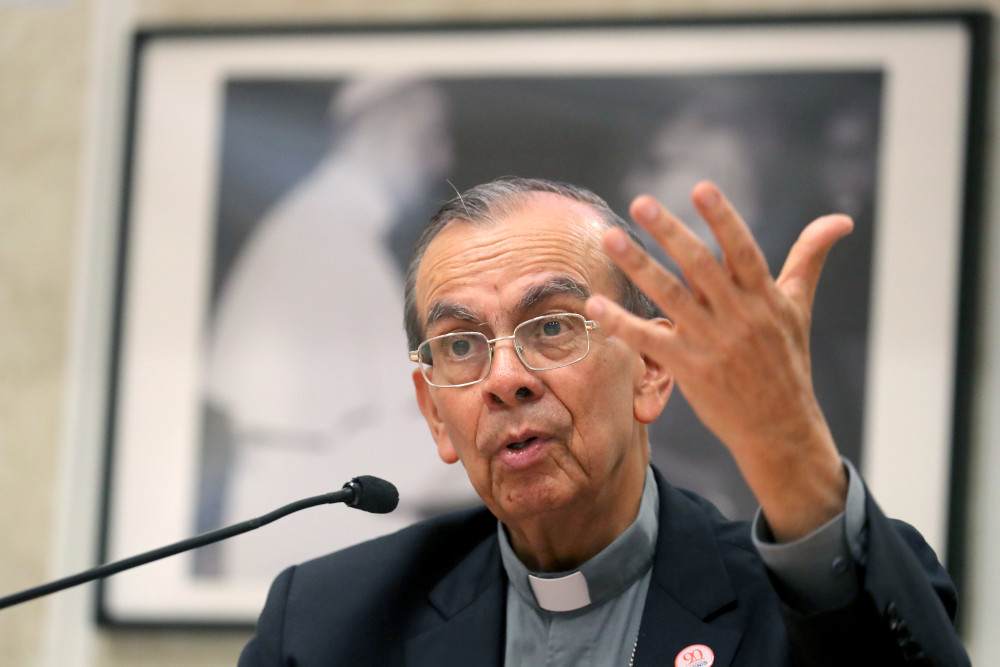
Cardinal Gregorio Rosa Chávez of San Salvador, El Salvador, is pictured in a file photo. (CNS/Reuters/Alessandro Bianchi)
Salvadoran prelates, including Cardinal Gregorio Rosa Chávez, have spoken of the high price that the country is paying for the moment of relative peace: arbitrary imprisonment without due process, the dismantling of the judicial system, and a search for revenge and not justice.
On election day, he said in his homily from St. Francis of Assisi Parish that the country's St. Oscar Romero is "interceding for us in heaven."
"He dreamed of a country without violence, without poverty, without injustice," the cardinal said. "A just country … he gave his life for that country."
More than 70,000 Salvadorans, or 2% of the population, are imprisoned and do not have the right to legal defense under the so-called "state of exception," in place since March 2022. A nonprofit says upwards of 6,000 Salvadorans have "disappeared" since Bukele assumed power, but are not counted as dead. More than 100,000 children and adolescents in the country have suffered the effects of the hardline anti-gang measures, including by losing both parents to imprisonment, says a recent report by the Humanitarian Legal Aid and Center for Exchange and Solidarity groups.
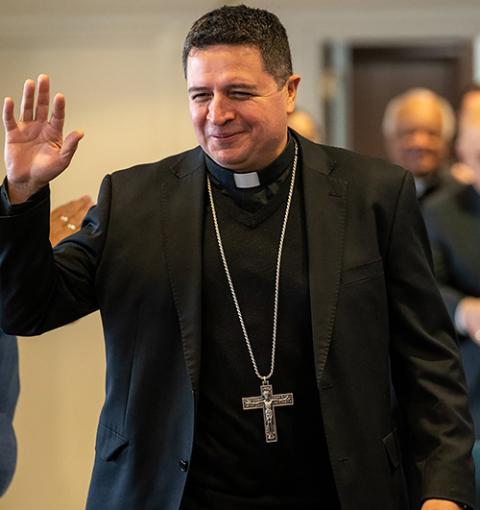
Bishop Evelio Menjívar-Ayala, auxiliary bishop for the Archdiocese of Washington, greets a crowd in Hyattsville, Maryland, in this 2022 file photo. (OSV News/Catholic Standard/Mihoko Owada)
During a pastoral visit to his home country of El Salvador, Auxiliary Bishop Evelio Menjívar-Ayala of Washington, D.C., said in a newspaper interview published Jan. 27 that while the country's problems must be fixed, they must be solved in a "fair" manner. "The people who have been detained have the right to a trial, since no one can be guilty if they have not been proven guilty," he said, adding that you "can't fight violence generating violence."
Salvadoran Vice President Félix Ulloa has admitted on several occasions that the government has "made mistakes" in some arrests. Some of those mistakes are irreversible, say organizations like Cristosal, because they have resulted in the death of innocent people.
Others also question Bukele's commitment against gangs since some news reports say that his government freed one of El Salvador's most notorious gang members called "the Crook," who was later captured by Mexican officials and extradited to the U.S.
But for those like Lazo, the apparent peace Bukele's policies have produced is what matters most. Her biggest worry is that it will disappear.
"It's so nice," she said. "We have never experienced it. It gives you hope and it is what I would like for other generations: a place where they can grow, even if it is expensive."
Advertisement
The "basic food basket," a measurement of goods Salvadorans use to gauge the cost of food, increased by 27% during Bukele's first presidential term. His experiment adopting bitcoin as El Salvador's legal tender has not produced the economic panacea he promised. There are concerns about the government's transparency, including in spending and borrowing of public money, as well as corruption allegations against members of his government.
The government also shows little desire to cooperate with the United States, which has the largest population of Salvadorans outside the country. A group of U.S. Congress members expressed in a letter their concern about the "democratic backsliding" of the country.
Those setbacks are something that Vice President Ulloa, in an interview with The New York Times, openly confirmed, saying that in El Salvador democracy is not just being dismantled, "we are eliminating it, we are replacing it with something new."
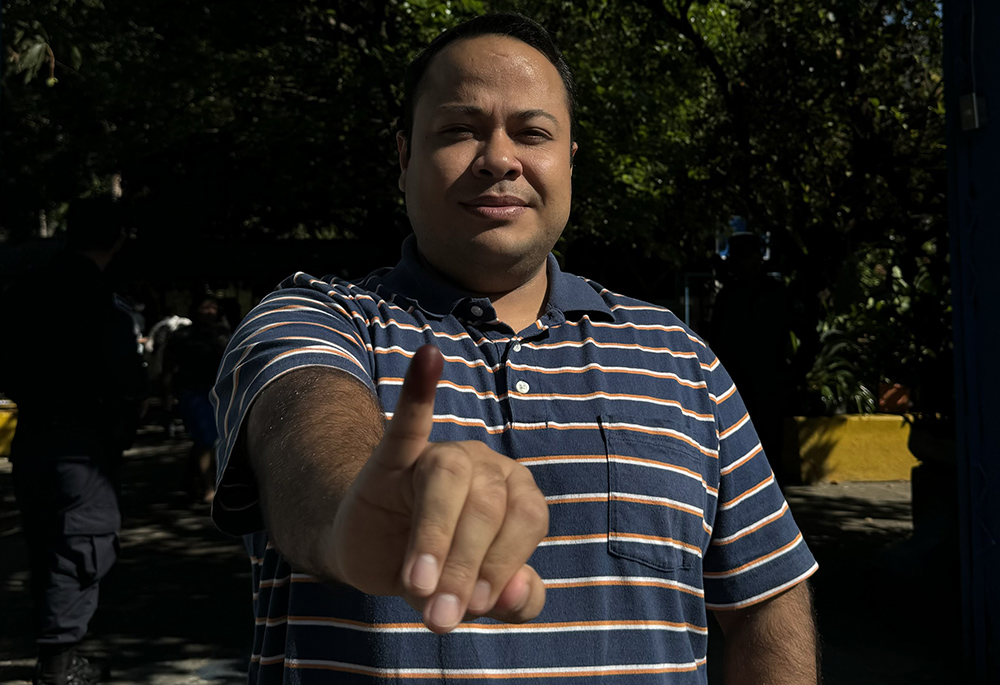
Felipe Abrego shows his tinted finger, proof of voting in presidential and legislative elections Feb. 4 in Chalatenango, El Salvador. (NCR photo/Rhina Guidos)
In his victory speech on Feb. 4, Bukele said there was no democracy to eliminate since it never existed in El Salvador. He recalled an exchange with a Spanish journalist who asked why it was being dismantled in El Salvador.
"What democracy are you talking about?" he said he asked the reporter. "[The reporter] spoke of a democracy his bosses talk about in Spain. But that's not democracy. That would be colonialism, imperialism, elitism, plutocracy, they can call it what they want."
Bukele asked other countries to "respect" the choice El Salvador made without mentioning the maneuvers he took to run for a consecutive term which the constitution does not allow, one that didn't seem to bother a lot of Salvadorans.
"We want you to come, visit us, know us. We want to be your friends, your allies, your partners. But what we won't be is your lackeys," said Bukele.






